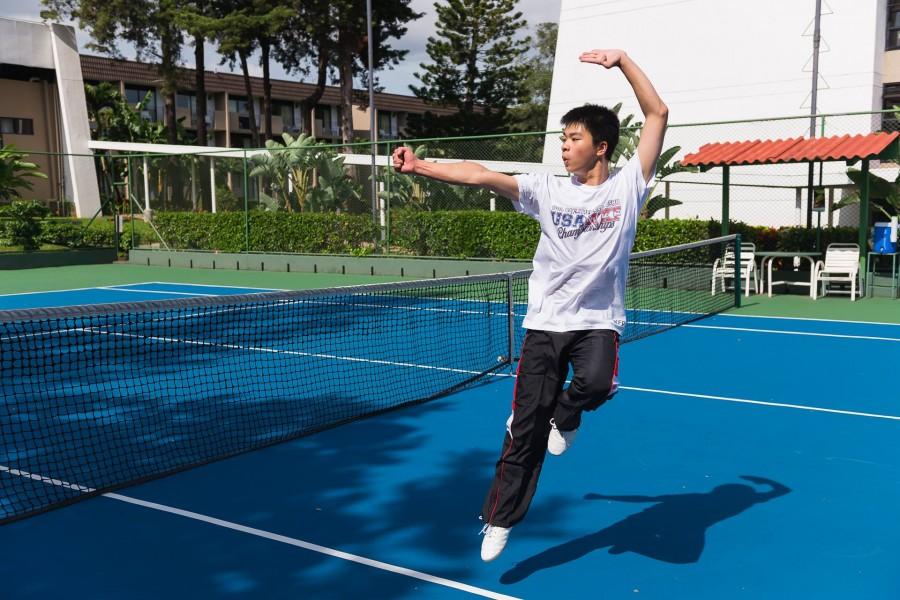Martial artist profile: Li dedicates time to perfecting the art of Wushu
Senior Richard Li practices Wushu outside of school and has traveled to exotic locations such as Costa Rica to demonstrate his prowess in international competitions.
October 29, 2014
At Jefferson, the cars of many families sport the iconic, tongue-in-cheek bumper sticker “We Came for the Sports.” Several of the school’s sports teams have been on the rise, especially since the move to the Capitol Conference. However, Jefferson is also home to successful athletes who play for teams outside of the school.
Senior Richard Li is one example of an athlete who devotes much of his free time to a rather unconventional sport. Li practices Wushu, a form of Chinese martial arts. He is a member of the Northern Virginia (NOVA) Wushu Academy, one of the many Wushu schools scattered across Virginia.
Background:
After some disappointing experiences with other sports, Li first learned Wushu the summer after the seventh grade. He tried his hand at the sport upon encouragement from a friend and his family. Since then, Li has improved swiftly, attaining first place at local tournaments for several different forms, including Advanced Jianshu (sword), Qianshu (spear), Chanquan (barehand or longfist) and Basic Gunshu (staff). In addition, Li has put his skills to the test during Chinese Honor Society’s International Night (I-Nite) performances.
Li and his teammates perform at fairs, cultural events and even basketball halftime shows for the Washington Wizards in order to increase the public’s appreciation for the sport. The academy also sends athletes to competitions that vary greatly in location and prestige; Li, for example, has been as far away as Costa Rica for a tournament. The judges of these competitions look for athletes who can perform with flair; demonstrate clean, fast and powerful movements; stay within bounds on the floor and execute jumps properly, among other things.
Current activities:
Li is currently working on three forms: barehand, straightsword and spear. After perfecting his technique, he will move on to training for Team Trials, which will be held in June. Li’s Wushu school is also preparing to attend a tournament at the University of Maryland, and the athletes will also be performing at halftime for a Wizards game around Christmastime.
Past competitions and recognition:
Team Trials, 2012, 2014 – made C team for Juniors
10th Pan-American Wushu Championships, 2014 – silver in Jianshu and bronze in Changquan New Jersey International Wushu Kungfu Tourney, 2013 – first, second and third place in straightsword, barehand and spear
Golden State International Wushu Championships, 2011 – first place in straightsword, barehand, and staff
University of Maryland tournament, 2011 – First place in beginners barehand
Q-and-A: On Oct. 23-24, tjTODAY interviewed Li about his commitment to and passion for Wushu.
Q: What is your favorite part of the sport?
A: Besides the people that I’ve come to treat as my family, it’s got to be the forms. You spend maybe hundreds of hours drilling, stretching, conditioning and learning a form, and you then put it all into 90 seconds of physical activity in front of the judges. Even if you don’t score high, you take a step back and say, “Wow, I’m proud of myself.”
Q: What is your favorite style of Wushu?
A: My chosen style is barehand, also known as changquan or longfist. Barehand is characterized by many fast movements, such as kicks and punches. Barehand is also more “graceful” in terms of flow, with long, continuous movements. The jumps are also different. There are also different weapon forms. As a changquan guy who’s flexible, and more lax than explosive, I do straightsword and spear currently.
Q: How do you balance your academic and social responsibilities with the time commitment required by Wushu?
A: For social events, I make sure I tell my coach and teammates if I can make it to training, and they’re understanding enough to know that I have a life outside Wushu. Academically, it’s more of a struggle. I have to cut hours off of training to do things ranging from college apps to staying after school for help. Still, I’ll make the most of what I have!
Q: What are some of the most important things you have learned from your experience with Wushu?
A: Time flies. You’re practicing for a performance in December, and it’s already May and Team Trials is around the corner.
Ask for help! Many people have trouble with this one. People will be glad to stretch you, critique your form, and spot you on weights and jumps. Even if I need a ride to my SAT, I ask my Wushu coach for help.
Learn to take a hit. Realize that you’re an athlete, and nothing comes to you easy. If you want to do a backflip, you’re going to fall. If you want a split, you’re going to cry. If you want to improve, take the criticism and say “thank you.”
Q: What future goals do you have?
A: I’m planning on continuing Wushu for a long, long time. Perhaps I’ll be a coach myself, one day. But until then, I’ll be doing adult team trials every other year that I can until I retire as an athlete. Perhaps, when Wushu is more stabilized – there are still occasional under-the-table dealings with judging and lots of disorganization – it may become an Olympic sport, and I’d love to go while I’m still in my prime. I do plan on training even in college; the University of Virginia and University of Maryland do have great Wushu programs!






